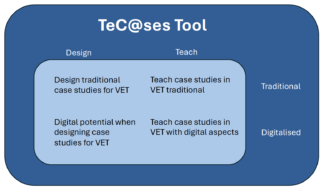
Structure of the TeC@ses tool
The international Erasmus+ project “Teaching case studies online: How to design and teach case studies in vocational schools” (TeC@ses) of the Universities of Antwerp, Cologne (co-ordinating institution), Tampere and the Prague University of Economicsand Business is divided into two modules.
For one, in the module “Design, interested teachers will have the opportunity to familiarise themselves with how to design didactically and pedagogically valuable business case studies for the classroom. The other module, “Teach”, will enable them to find out how to incorporate such a case study into their lessons.
Current status of the module “Design”
The module “Design” is divided into the learning units “Design traditional case studies for VET” and “Digital potential when designing case studies for VET”.
The project team produced the first version of the learning unit “Design traditional case studies for VET” in English by the end of May. This was based on feedback from teachers involved who evaluated the structure of the TeC@ses tool. The learning unit has therefore been structured according to didactic quality criteria for case studies.
Now that the first half of the module “Design” has been developed, we are working on developing the learning nuggets for the learning unit “Digital potential when designing case studies for VET”.
 Outline concept of the TeC@ses tool
Outline concept of the TeC@ses tool
These learning nuggets are intended to support teachers in designing case studies with digital aspects and teaching with them in a digitalised context. By expanding their digital skills, which are required for media-supported and innovative teaching, vocational teachers can meet the challenges of the digital transformation in the educational landscape.
Evaluation of the tool by teachers
In September 2024, vocational teachers from the partner countries will re- view the module “Design”. The future users will be asked to evaluate the first version of the module and provide feedback on its suitability for practical use in terms of content, didactics and technical aspects. This will result in an improved version of the module and learning effects for the upcoming development of the module “Teach”. By involving the vocational teachers several times, the focus will be placed on the benefits for interested teachers right from the start.
Preparations for the next project meeting in Antwerp
In addition to developing the content elements, the coordination of the international team is also part of the project work. Alongside the regular virtual meetings, the transnational project meeting in Antwerp from 27 November to 29 November 2024 is currently being planned. A total of four in-person meetings are scheduled during the project term. The meeting in Antwerp will build on the face-to-face meeting that took place in Prague in February 2024.
Current publications
Below you find current literature and research results in English on business cases that may be of interest to you. Feel free to click on the blue titles and take a look:
- Pilz, M., Tögel, J, Alberts, S., van den Oord, S., Cramer, T., & Viteckova, K. (2024): Teaching with business cases in higher education: Expectations and practical implementation by lecturers of management (Preprint).
- Bayona, J. A., & Durán, W. F. (2024): A meta-analysis of the influence of case method and lecture teaching on cognitive and affective learning outcomes. The International Journal of Management Education, 22(1).
- Hofmeister, C., & Pilz, M. (2023): Do cases always deliver what they promise? A quality analysis of business cases in higher education. Education Sciences, 14(1).
- Heuer, S., & Pilz, M. (2022): Work-orientated learning: The use of case studies in business education from a student’s perspective.
The newsletter will be sent every four months. If you would like to speed up the time until the next newsletter, you are welcome to discover the new homepage for the TeC@ses project with lots of up-to-date and helpful information.
Contact: ilmari.puhakka@tuni.fi


Funded by the European Union. Views and opinions expressed are however those of the author(s) only and do not necessarily reflect those of the European Union or the European Education and Culture Executive Agency (EACEA). Neither the European Union nor EACEA can be held responsible for them.

